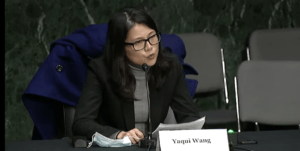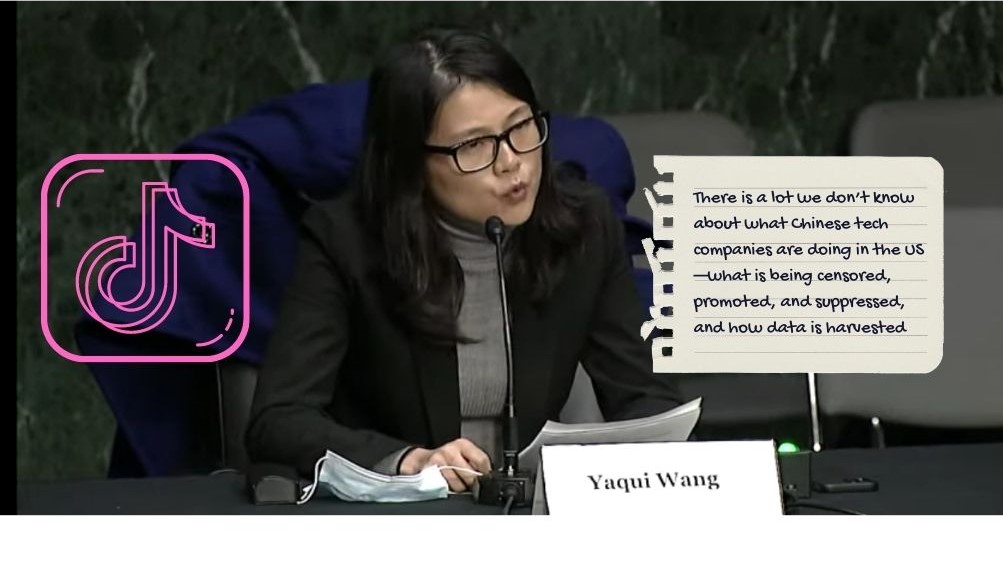On Wednesday, the Congressional-Executive Commission on China heard from four witnesses to give their view of the rise of what they called “techno-authoritarianism.”
“The Chinese government’s embrace of mass biometric collection technologies underpins the most pervasive surveillance state the world has ever seen. The Chinese model of extensive censorship and surveillance continues to spread to governments with poor human rights records that repress and control populations through technology made in China,” the Commission said.
Surveillance and human rights aside, China’s gains in high technology equipment, both hardware components and software used in things like voice and facial recognition, are being sold to other emerging markets throughout Asia and Africa. This “Digital Silk Road” gives China a new kind of leverage and power over its trading partners, and its rivals. In short, the U.S. has a serious competitor on the tech front. Worried that the U.S. will cut them out, China is investing heavily in expanding, and locking in new markets.
The concept of a Digital Silk Road was first mentioned in 2015 in Beijing, as the “Information Silk Road,” but its roots go back to the 1980s. Chinese leaders fashioned industrial policies and negotiated deals with foreign companies that helped Chinese telecommunications firms like Huawei dramatically improve their capabilities. IP theft also paved the way. Through the Digital Silk Road, China aims to reduce its dependency on foreign computer hardware (think semiconductors) and software and become a much cheaper rival than anything the U.S. can think up.
Wednesday’s hearing is mostly for security policy wonks and fans of China’s geopolitical intrigue. Some sounded louder alarm bells. Others were more complacent sounding, looking at China’s use of technology and data as a business decision more than a political one. Everyone agreed China is not on par with Japan or the U.S. yet, but they will be sooner rather than later.
Here are some excerpts of the opening remarks from the four witnesses.
Jonathan E. Hillman , Senior Fellow, Economics Program, and Director, Reconnecting Asia Project, Center for Strategic and International Studies
, Senior Fellow, Economics Program, and Director, Reconnecting Asia Project, Center for Strategic and International Studies
“Foreign companies rushed into China and helped to create their own competitors. Foreign manufacturers handed over access to their knowledge and capabilities, consultants helped transform Chinese companies’ business operations, and researchers went to work or their former companies’ competitors. After China’s domestic telecommunications capabilities matured, Chinese officials, restricted market access for foreign companies. Avoiding these mistakes in emerging technologies will require closer public-private cooperation among the United States, its partners, and allies.
(Sadly, Silicon Valley, Intel, and others continue to invest in China’s rise on the semiconductor side.)
“China presents a challenge of scale. Its population of 1.4 billion provides Chinese companies with preferred access to the world’s largest market of middle-class consumers and the government with access to an ocean of data. The Chinese government’s ability to direct resources, even if inefficient and wasteful, is giving a boost to emerging technologies and subsidizing the cost of Chinese equipment globally.”
Yaqui Wang, Senior China Researcher, Human Rights Watch
“The Chinese diaspora heavily relies on the super-app WeChat for information, communication, and even political organizing. This allows Beijing to shape the Chinese diaspora’s views in ways more amenable to the CCP. It allows Beijing to know a lot about the people who have left China, down to things like who is meeting whom, at what time, and where. And it also allows Beijing to surveil and potentially influence and mobilize an important demographic in the US.
(CCP has a board seat at ByteDance, the corporate owners of TikTok.)
“There is a lot we don’t know about what Chinese tech companies are doing in the US—what is being censored, promoted, and suppressed, and how data is being harvested, accessed, used, and shared. There are risks that these companies can be or are being used by the Chinese government to undermine the rights of American users.
Dr. Samantha Hoffman, Senior Analyst, The Australian Strategic Policy Institute
“For the Party-state, problem-solving technologies can also enhance authoritarian control, the two are not mutually exclusive. The tendency to compartmentalize “good” and “bad” use points to a failure to conceptualize the strategic potential value of the technologies. The Chinese Party-state sets itself apart because it is setting itself up to be able to exploit that inherent dual-use at all times. This is notable in terms of how it applies PRC law to Chinese companies and in terms of how it seeks to seize advantages in the development of technical standards.
“China’s tech-enhanced authoritarianism is unique in a national context. When these technologies are exported globally, it is not necessarily the intent of an end user to use them in ways that enhance authoritarian power. Some fragile democracies or illiberal regimes import the technologies for coercive purposes, but others are genuinely seeking the best and most affordable technologies for problem-solving.”
(Huawei 5G is more affordable than European networks. Argentina is a fan. As are parts of Colombia, like Bogota.)
Geoffrey Cain, Author, “The Perfect Police State: An Undercover Odyssey Into China’s Terrifying Surveillance Dystopia of the Future”, Congressional Innovation Fellow, TechCongress
“In interviews, Uyghur and Kazakh refugees all told similar stories about the region’s descent into a total surveillance dystopia. First and most commonly, they recounted how authorities from the Ministry of Public Security, the Ministry of State Security, and Chinese technology firms such as Huawei, Hikvision, SenseTime, Megvii, and others have innovated the technologies that are deployed for a dragnet. The police used these technologies for what interviewees say is a system of psychological torture. When refugees and former camp detainees say “psychological torture,” they meant the feeling of constantly being watched, not by humans, but by crude software systems designed to predict future crimes and acts of terrorism, with great inaccuracy.
(As of October 31, American investment company T. Rowe Price was an investor in Hikvision.)
“Since 2016, the People’s Republic of China has engaged in an unprecedented experiment in social control in Xinjiang. It has deployed novel technologies in artificial intelligence, facial recognition, voice recognition, and biometric data collection to oppress its people in new ways. In the twentieth century, genocides took place in gas chambers and mass graves. But in the twenty-first century, modern technology has allowed the People’s Republic of China to commit the beginnings of genocide, wiping out a people in silence, through cultural erasure and forced sterilizations, without the use of mass physical violence and killings.”













